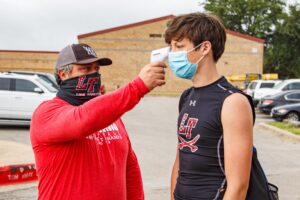By David Mullen
This year of the pandemic has affected so many things that we took for granted and used to look forward to every year. Like competitive sports.
The professional leagues have dealt with the COVID-19 crisis in dramatically different ways, with varying degrees of success. The NHL was an early adapter of strong quarantine programs. Teams could only finish out the season in Toronto and Edmonton without fans, with the Stanley Cup Finals held in the Alberta oil town ending an improbable run by the Western Conference champion Dallas Stars without coronavirus issues.

Photo courtesy of Brownwood Bulletin
Basketball reached out to Mickey Mouse and he opened the Enchanted Castle to allow for continuation of the NBA season without fans. Players complained about Orlando like kids facing a long line at Space Mountain, but the results were positive and tests were negative. The NBA was truly in Tomorrowland.
Major League Baseball and the NFL have been more cavalier in their approach, and consequently have had to deal with the most issues. Without a bubble, baseball’s 2020 season became farcical, as entire teams were forced to miss games for days and then try to make them up in a ridiculously tight timeframe. Only for the late playoffs and World Series did the league adopt a bubble strategy. The NFL is still very much a work in progress, allowing some fans in some venues, including Jerry World, and has just faced the first of what could be many game postponements.
But this is Texas in the fall. That brings to mind the State Fair of Texas. Cancelled. College Football games. On again, off again. And high school athletics, especially the sacred football games referred to reverently as “Friday Night Lights.”
As high school and youth sports organizations grapple with how fast is too fast to resume play, and especially to bring back players recovering from a positive COVID-19 test, a Texas doctor has a vested interest.
Dr. Clarisa Garcia is the medical director at Pediatric Cardiology Associates of Houston and is a board-certified pediatric cardiologist at Children’s Health. She focuses on general cardiology, preventative cardiology and cardiac health in athletes. She is concerned that youngsters could be tossed back into a competitive sports environment too quickly after recovering from the symptoms caused by COVID-19, and her opinions are not just based on her career.
Dr. Garcia and her husband are raising four children and coaching their sports teams.
She worked at Children’s Health in Dallas for three years before she was given the opportunity to get back to the Texas gulf to be closer to her family. She was born and raised in South Texas. “All of my children are athletes,” Dr. Garcia said. “My son played college football and all of my children play sports. It is important for my family to come and watch them play.”
Dr. Garcia said that some families and pediatricians are keeping up by contacting their offices wanting to know if it is safe for their children or patients to return. “A lot of times, we listen to their history and whether we are concerned that [they could be susceptible] to myocarditis [inflammation of the heart]. We use an electrocardiogram or an echocardiogram to look at the actual structure of the heart and the function of the heart.”
The screening seems to be working, as Dr. Garcia has yet to see a case in a youth athlete that has escalated into a perilous situation.
“Whether children return to play in sports is really a decision that a family and a pediatrician would make,” Dr. Garcia said. “But we know that there have been some studies that a small set of athletes, after they have been tested positive for COVID, have had signs of inflammation in their hearts. Myocarditis, which is not new, is something we have seen with other viruses that causes to damage to the heart and causes the heart to not function well.
“Because of that, we are being very cautious to make sure that athletes and families know of the signs and symptoms of myocarditis to prevent any cardiac arrest.”
While there is no known prevention for heart inflammation “we do know that a patient that has had COVID-19 symptoms should be restricted for 14 days from physical activity,” Dr. Garcia said. “We have known that those with myocarditis who are exercising during the time that the virus is present can sometimes increase the amount of the virus and increase destruction of the heart. We recommend no exercise for 14 days.”
After the two-week downtime period, it is decided by doctors, based on the level of symptoms, what steps a young athlete should take moving forward.
So far, Dr. Garcia’s strategies have produced positive health results for these young athletes. But, inexplicably, the COVID-19 virus remains a political issue and continues to be downplayed, even by recent COVID victim President Donald J. Trump. Because of outside influences, are parents trying to push their young athletes to return to play too soon?
“So, I think in general, we always see the families that are more encouraging to get their children back on the field,” Dr. Garcia said. “But that is why we think this education is so important. We all know that parents love their children and that they wouldn’t push them into a situation that was dangerous for them. I think sometimes it is just not having the knowledge of what actually could happen. It is important that families know what those risks are.
“I am keeping my pulse on all of the sports stuff, because I want my kids to participate. But I want them to be safe.” Spoken like a true parent, who happens to be a cardiologist.
